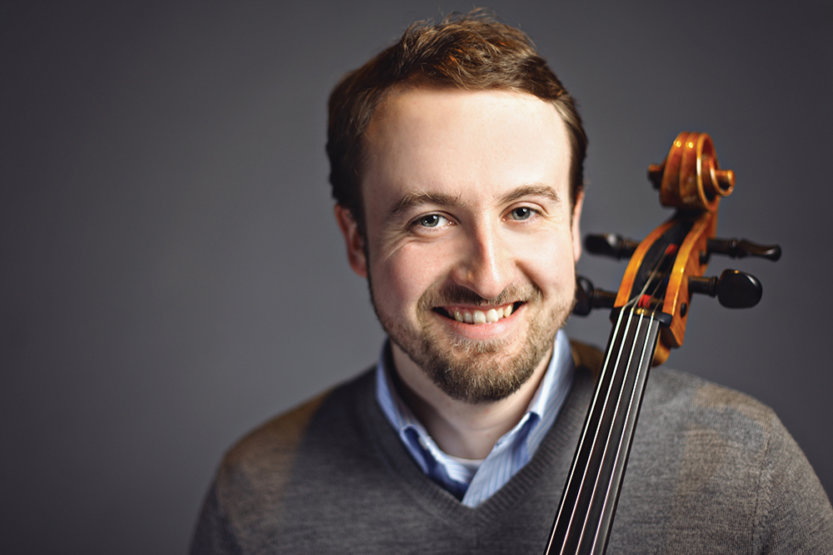Chamber-alt Cellist
 Ryan Ash is cellist with the Beo String Quartet, a Pittsburgh-based ensemble whose music he describes as “in the progressive rock and alternative genres, but crafted straight from our classical training.” (Image by Jamie Rennich/justjamesstudio)
Ryan Ash is cellist with the Beo String Quartet, a Pittsburgh-based ensemble whose music he describes as “in the progressive rock and alternative genres, but crafted straight from our classical training.” (Image by Jamie Rennich/justjamesstudio) They play music in a converted garage. Equipped with a vaulted ceiling and retrofitted with asymmetrical walls, vibration-free floor and acoustical insulation, the space has gone from a bay for your dad’s Oldsmobile to a state-of-the-art recording studio—a venue as eclectic as the group that created it.
A “chamber-alt” ensemble from Pittsburgh, the Beo String Quartet is given to mashing up luscious baroque strings and heavy metal–derived riffs with other sounds on an as-needed basis.
“The sound color is definitely in the progressive rock and alternative genres,” says cellist Ryan K. Ash, ’10 FAA, “but crafted straight from our classical training.” Beo—a Latin word meaning to gladden or make happy—navigates a repertoire that swerves from Beethoven string quartets to “This is My Scary Robot Voice,” a piece by award-winning composer (and U of I faculty member) Kerrith Livengood that draws inspiration from the speaking cadences of artificial intelligence. The quartet’s 2021 album, Ghosts Revisited, is “very close to progressive rock,” Ash says. “If you want to turn your brain off and jam out, you can do that. But if you are used to listening to classical music, you might notice a lot of weird meter changes and polyrhythms. You might wonder what key we’re in. A lot of pop music just sets a beat and goes [from there]. This music is not like that.”
Ash studied cello at Illinois with such luminaries as Brandon Vamos and the Pacifica Quartet, and Donald Schleicher, emeritus conductor of U of I’s Symphony Orchestra. He joined the Beo String Quartet six years ago after he completed his graduate study in music at Roosevelt University and moved to Pittsburgh. “I met my current colleagues at one of their concerts,” he says. Soon, they were making beautiful music together—and eventually, they were making that music in a garage.
The studio became possible when Beo composer and viola player Sean Neukom bought a house with an extra garage in a remote Pittsburgh neighborhood. Studio conversion was completed last fall, allowing the quartet to begin streaming performances in lieu of vanished in-person concert appearances and residencies. Now, that dream studio is being used for a dream project—adapting classical chamber pieces for performance by K–12 school orchestras.
Ash dates his own early music education back to kitchen-table discussions with his parents. First came piano. “They said, ‘Why don’t you play piano? We have one. It’s just like typing,’ ” Ash recalls. “And I told them, ‘I’m 6 years old. I don’t know how to type.’ ” Then came cello. “They said, ‘You get to sit down while you play the cello.’ I said, ‘Oh, ha ha. That’s the instrument for me.’”

